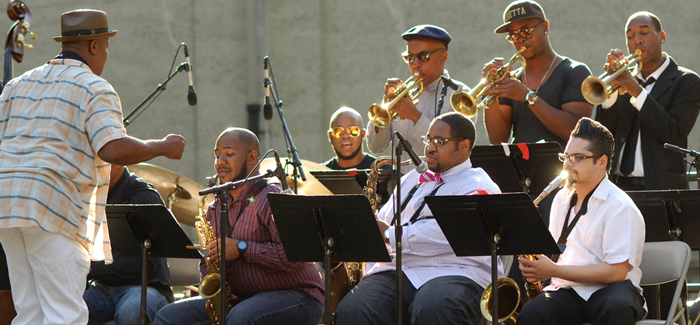
The Live the Spirit Residency Big Band performs at the Englewood Jazz Festival in 2012. (Photography by Don Getsug/courtesy Will Faber)
Ethnomusicology graduate students discover community involvement comes with the concentration.
Writing an article on ethnomusicology graduate students for the fall issue of Tableau, one of the unexpected recurring themes I discovered was the way the students’ work expands outward to the community. It shouldn’t have been surprising: music, especially live performance, brings together the players, the audience, and even the neighborhood that supports it.
In 2009, for example, Will Faber, AM’13, a PhD student who studies popular black music in Britain, collaborated with Joanie Friedman, the Civic Knowledge Project coordinator of the Southside Arts and Humanities Network, on a project for the graduate course Engaging Ethnomusicology. The course, which stressed community-based learning, encouraged graduate students like Faber to interact with Chicago’s South Side communities for their research. For his project, Faber conducted in-depth interviews of Southside Arts and Humanities Network member organizations and helped catalog and digitize 11 years’ worth of videotaped footage from the archives of the Bronzeville/Black Chicagoan Historical Society. The digitized histories were later used in an exhibition titled Great Migration: What They Brought With Them, presented by the historical society (for whom Faber also gave a digital workshop, passing on what he learned from his experience cataloging the interviews).
Faber, who plays guitar and several other instruments, has continued his community involvement. He is currently president of the Live the Spirit Residency, an organization based in Chicago’s Englewood neighborhood that provides an after-school jazz education program, produces the Englewood Jazz Festival, and hosts senior citizens’ bands. “I’ve learned a bajillion things about how to be an advocate for a community,” he says, which includes providing jazz mentorships to young musicians. “We connect them with professional musicians from Chicago and provide examples of leadership.”
Faber has partnered with fellow graduate student Alisha Lola Jones, who is studying the role of black men’s gender and sexuality in gospel music. Together they worked on a business plan for opening up cultural centers in low-income, high-minority neighborhoods in Chicago, where "we’d provide self-guided music education,” she explains. “Students could drop in and receive musical mentorship from people we’d provide.”
Jones also works on an annual conference called Genius for Men: “We use musical tributes to talk about the way men are redefining thoughtfulness and action when it’s in our communities,” she says. “We focus on illustrating people’s stories.”
